
This aerial photo taken on Nov. 19, 2023 shows Luoyang Bridge, one of China's four famous ancient bridges, in Quanzhou, southeast China's Fujian Province. Located at the eastern end of the maritime Silk Road, Fujian has given play to its unique strengths in the joint implementation of the Belt and Road Initiative (BRI) and achieved fruitful results in building the core region of the 21st Century Maritime Silk Road.
In recent years, the province has been dedicated to protect legacies along the ancient Maritime Silk Road and tried to revive its historical prosperity.
Quanzhou, for instance, was one of the world's largest ports along the historic Maritime Silk Road, particularly in ancient China's Song Dynasty (960-1279) and Yuan Dynasty (1271-1368). "Quanzhou: Emporium of the World in Song-Yuan China" was accepted by the UNESCO as a cultural property on its World Heritage List in July 2021. (Xinhua/Jiang Kehong)

This aerial photo taken on Nov. 20, 2023 shows the residential houses at Daimei Village, known as the "ancient village on water", in Longhai City, southeast China's Fujian Province. Located at the eastern end of the maritime Silk Road, Fujian has given play to its unique strengths in the joint implementation of the Belt and Road Initiative (BRI) and achieved fruitful results in building the core region of the 21st Century Maritime Silk Road.
In recent years, the province has been dedicated to protect legacies along the ancient Maritime Silk Road and tried to revive its historical prosperity.
Quanzhou, for instance, was one of the world's largest ports along the historic Maritime Silk Road, particularly in ancient China's Song Dynasty (960-1279) and Yuan Dynasty (1271-1368). "Quanzhou: Emporium of the World in Song-Yuan China" was accepted by the UNESCO as a cultural property on its World Heritage List in July 2021. (Xinhua/Jiang Kehong)
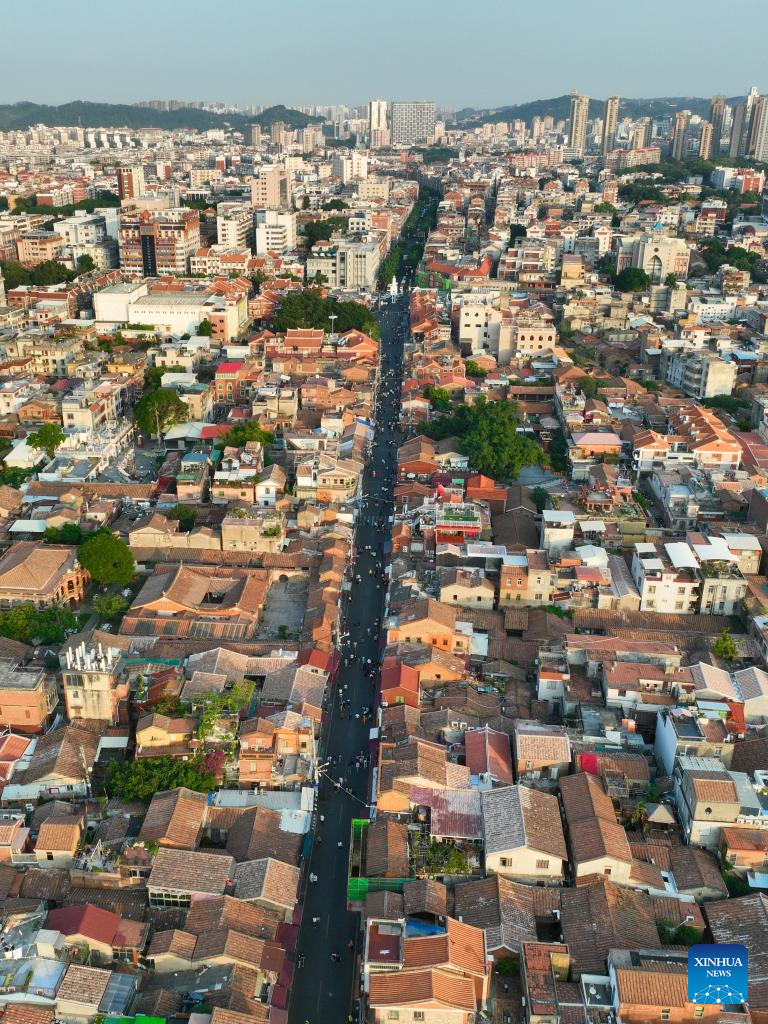
This aerial photo taken on Nov. 7, 2023 shows a view of Xijie, an ancient street area, in Quanzhou, southeast China's Fujian Province. Located at the eastern end of the maritime Silk Road, Fujian has given play to its unique strengths in the joint implementation of the Belt and Road Initiative (BRI) and achieved fruitful results in building the core region of the 21st Century Maritime Silk Road.
In recent years, the province has been dedicated to protect legacies along the ancient Maritime Silk Road and tried to revive its historical prosperity.
Quanzhou, for instance, was one of the world's largest ports along the historic Maritime Silk Road, particularly in ancient China's Song Dynasty (960-1279) and Yuan Dynasty (1271-1368). "Quanzhou: Emporium of the World in Song-Yuan China" was accepted by the UNESCO as a cultural property on its World Heritage List in July 2021. (Xinhua/Jiang Kehong)

This aerial photo taken on Nov. 20, 2023 shows the residential houses at Daimei Village, known as the "ancient village on water", in Longhai City, southeast China's Fujian Province. Located at the eastern end of the maritime Silk Road, Fujian has given play to its unique strengths in the joint implementation of the Belt and Road Initiative (BRI) and achieved fruitful results in building the core region of the 21st Century Maritime Silk Road.
In recent years, the province has been dedicated to protect legacies along the ancient Maritime Silk Road and tried to revive its historical prosperity.
Quanzhou, for instance, was one of the world's largest ports along the historic Maritime Silk Road, particularly in ancient China's Song Dynasty (960-1279) and Yuan Dynasty (1271-1368). "Quanzhou: Emporium of the World in Song-Yuan China" was accepted by the UNESCO as a cultural property on its World Heritage List in July 2021. (Xinhua/Jiang Kehong)

This aerial photo taken on Nov. 7, 2023 shows the east and west pagodas of Kaiyuan Temple and the surrounding core area for ancient city conservation in Quanzhou, southeast China's Fujian Province. Located at the eastern end of the maritime Silk Road, Fujian has given play to its unique strengths in the joint implementation of the Belt and Road Initiative (BRI) and achieved fruitful results in building the core region of the 21st Century Maritime Silk Road.
In recent years, the province has been dedicated to protect legacies along the ancient Maritime Silk Road and tried to revive its historical prosperity.
Quanzhou, for instance, was one of the world's largest ports along the historic Maritime Silk Road, particularly in ancient China's Song Dynasty (960-1279) and Yuan Dynasty (1271-1368). "Quanzhou: Emporium of the World in Song-Yuan China" was accepted by the UNESCO as a cultural property on its World Heritage List in July 2021. (Xinhua/Jiang Kehong)
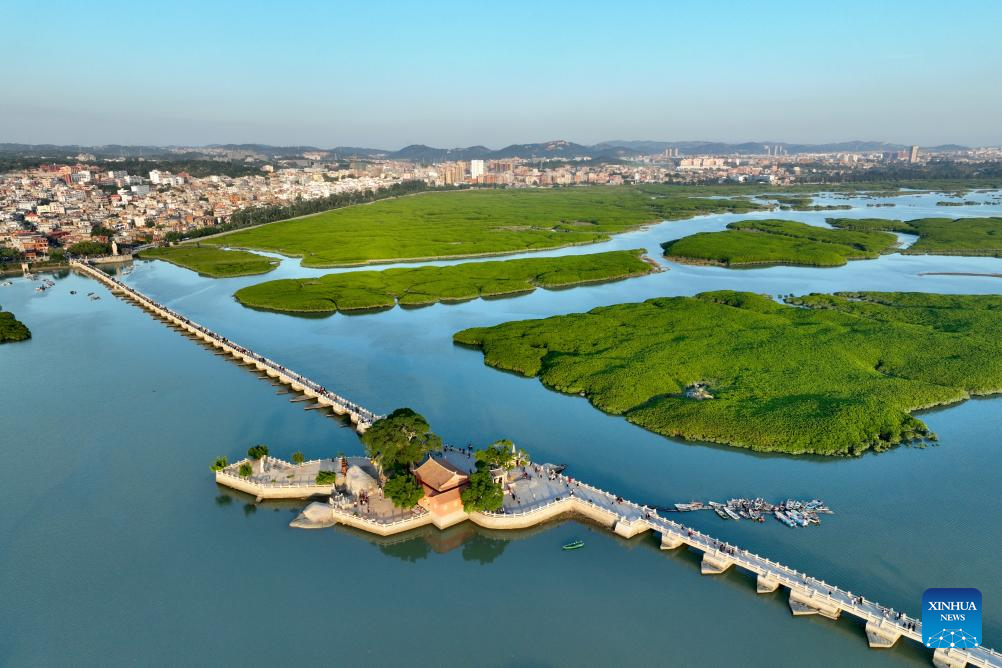
This aerial photo taken on Nov. 19, 2023 shows Luoyang Bridge, one of China's four famous ancient bridges, in Quanzhou, southeast China's Fujian Province. Located at the eastern end of the maritime Silk Road, Fujian has given play to its unique strengths in the joint implementation of the Belt and Road Initiative (BRI) and achieved fruitful results in building the core region of the 21st Century Maritime Silk Road.
In recent years, the province has been dedicated to protect legacies along the ancient Maritime Silk Road and tried to revive its historical prosperity.
Quanzhou, for instance, was one of the world's largest ports along the historic Maritime Silk Road, particularly in ancient China's Song Dynasty (960-1279) and Yuan Dynasty (1271-1368). "Quanzhou: Emporium of the World in Song-Yuan China" was accepted by the UNESCO as a cultural property on its World Heritage List in July 2021. (Xinhua/Jiang Kehong)
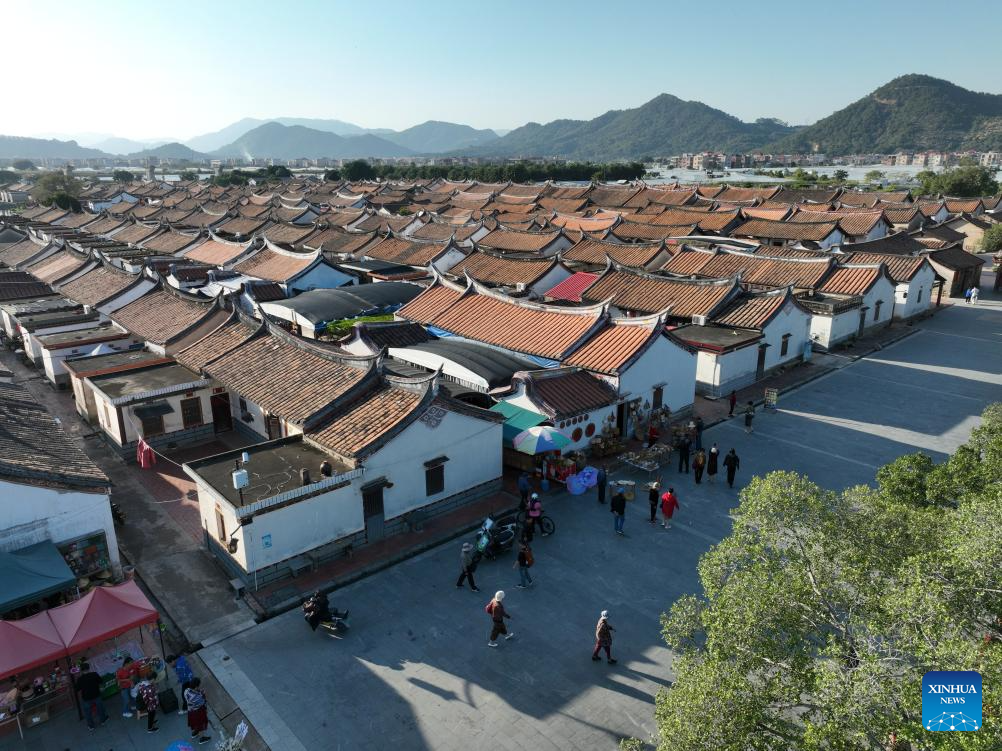
This aerial photo taken on Nov. 20, 2023 shows the residential houses at Daimei Village, known as the "ancient village on water", in Longhai City, southeast China's Fujian Province. Located at the eastern end of the maritime Silk Road, Fujian has given play to its unique strengths in the joint implementation of the Belt and Road Initiative (BRI) and achieved fruitful results in building the core region of the 21st Century Maritime Silk Road.
In recent years, the province has been dedicated to protect legacies along the ancient Maritime Silk Road and tried to revive its historical prosperity.
Quanzhou, for instance, was one of the world's largest ports along the historic Maritime Silk Road, particularly in ancient China's Song Dynasty (960-1279) and Yuan Dynasty (1271-1368). "Quanzhou: Emporium of the World in Song-Yuan China" was accepted by the UNESCO as a cultural property on its World Heritage List in July 2021. (Xinhua/Jiang Kehong)

This aerial photo taken on Nov. 20, 2023 shows a view of Douxiang Village in Longhai District of Zhangzhou City, southeast China's Fujian Province. Located at the eastern end of the maritime Silk Road, Fujian has given play to its unique strengths in the joint implementation of the Belt and Road Initiative (BRI) and achieved fruitful results in building the core region of the 21st Century Maritime Silk Road.
In recent years, the province has been dedicated to protect legacies along the ancient Maritime Silk Road and tried to revive its historical prosperity.
Quanzhou, for instance, was one of the world's largest ports along the historic Maritime Silk Road, particularly in ancient China's Song Dynasty (960-1279) and Yuan Dynasty (1271-1368). "Quanzhou: Emporium of the World in Song-Yuan China" was accepted by the UNESCO as a cultural property on its World Heritage List in July 2021. (Xinhua/Jiang Kehong)

This aerial photo taken on Nov. 7, 2023 shows a wooden construction named Chaotianmen, one of the seven city gates of ancient Quanzhou, southeast China's Fujian Province. Located at the eastern end of the maritime Silk Road, Fujian has given play to its unique strengths in the joint implementation of the Belt and Road Initiative (BRI) and achieved fruitful results in building the core region of the 21st Century Maritime Silk Road.
In recent years, the province has been dedicated to protect legacies along the ancient Maritime Silk Road and tried to revive its historical prosperity.
Quanzhou, for instance, was one of the world's largest ports along the historic Maritime Silk Road, particularly in ancient China's Song Dynasty (960-1279) and Yuan Dynasty (1271-1368). "Quanzhou: Emporium of the World in Song-Yuan China" was accepted by the UNESCO as a cultural property on its World Heritage List in July 2021. (Xinhua/Jiang Kehong)

This aerial photo taken on Nov. 7, 2023 shows the east and west pagodas of Kaiyuan Temple and the surrounding core area for ancient city conservation in Quanzhou, southeast China's Fujian Province. Located at the eastern end of the maritime Silk Road, Fujian has given play to its unique strengths in the joint implementation of the Belt and Road Initiative (BRI) and achieved fruitful results in building the core region of the 21st Century Maritime Silk Road.
In recent years, the province has been dedicated to protect legacies along the ancient Maritime Silk Road and tried to revive its historical prosperity.
Quanzhou, for instance, was one of the world's largest ports along the historic Maritime Silk Road, particularly in ancient China's Song Dynasty (960-1279) and Yuan Dynasty (1271-1368). "Quanzhou: Emporium of the World in Song-Yuan China" was accepted by the UNESCO as a cultural property on its World Heritage List in July 2021. (Xinhua/Jiang Kehong)

This aerial photo taken on Nov. 20, 2023 shows the residential houses at Daimei Village, known as the "ancient village on water", in Longhai City, southeast China's Fujian Province. Located at the eastern end of the maritime Silk Road, Fujian has given play to its unique strengths in the joint implementation of the Belt and Road Initiative (BRI) and achieved fruitful results in building the core region of the 21st Century Maritime Silk Road.
In recent years, the province has been dedicated to protect legacies along the ancient Maritime Silk Road and tried to revive its historical prosperity.
Quanzhou, for instance, was one of the world's largest ports along the historic Maritime Silk Road, particularly in ancient China's Song Dynasty (960-1279) and Yuan Dynasty (1271-1368). "Quanzhou: Emporium of the World in Song-Yuan China" was accepted by the UNESCO as a cultural property on its World Heritage List in July 2021. (Xinhua/Jiang Kehong)

This aerial photo taken on Nov. 20, 2023 shows a view of Yue port in Zhangzhou, southeast China's Fujian Province. Located at the eastern end of the maritime Silk Road, Fujian has given play to its unique strengths in the joint implementation of the Belt and Road Initiative (BRI) and achieved fruitful results in building the core region of the 21st Century Maritime Silk Road.
In recent years, the province has been dedicated to protect legacies along the ancient Maritime Silk Road and tried to revive its historical prosperity.
Quanzhou, for instance, was one of the world's largest ports along the historic Maritime Silk Road, particularly in ancient China's Song Dynasty (960-1279) and Yuan Dynasty (1271-1368). "Quanzhou: Emporium of the World in Song-Yuan China" was accepted by the UNESCO as a cultural property on its World Heritage List in July 2021. (Xinhua/Jiang Kehong)
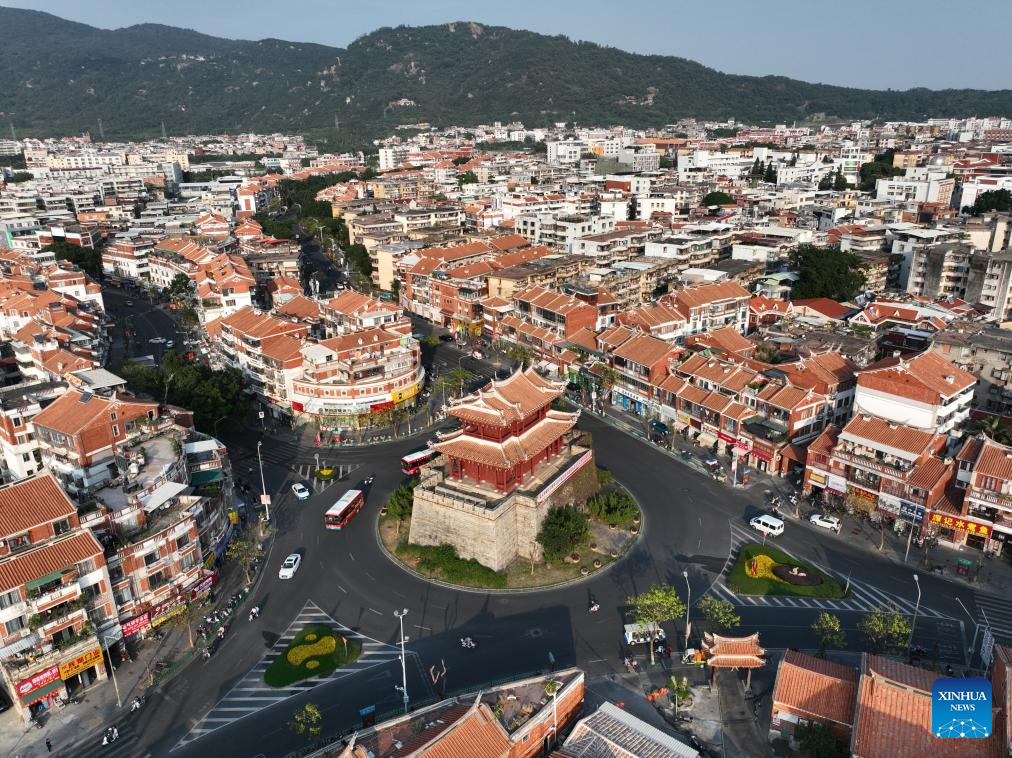
This aerial photo taken on Nov. 7, 2023 shows a wooden construction named Chaotianmen, one of the seven city gates of ancient Quanzhou, southeast China's Fujian Province. Located at the eastern end of the maritime Silk Road, Fujian has given play to its unique strengths in the joint implementation of the Belt and Road Initiative (BRI) and achieved fruitful results in building the core region of the 21st Century Maritime Silk Road.
In recent years, the province has been dedicated to protect legacies along the ancient Maritime Silk Road and tried to revive its historical prosperity.
Quanzhou, for instance, was one of the world's largest ports along the historic Maritime Silk Road, particularly in ancient China's Song Dynasty (960-1279) and Yuan Dynasty (1271-1368). "Quanzhou: Emporium of the World in Song-Yuan China" was accepted by the UNESCO as a cultural property on its World Heritage List in July 2021. (Xinhua/Jiang Kehong)

This aerial photo taken on Nov. 20, 2023 shows a street in Douxiang Village in Longhai District of Zhangzhou City, southeast China's Fujian Province. Located at the eastern end of the maritime Silk Road, Fujian has given play to its unique strengths in the joint implementation of the Belt and Road Initiative (BRI) and achieved fruitful results in building the core region of the 21st Century Maritime Silk Road.
In recent years, the province has been dedicated to protect legacies along the ancient Maritime Silk Road and tried to revive its historical prosperity.
Quanzhou, for instance, was one of the world's largest ports along the historic Maritime Silk Road, particularly in ancient China's Song Dynasty (960-1279) and Yuan Dynasty (1271-1368). "Quanzhou: Emporium of the World in Song-Yuan China" was accepted by the UNESCO as a cultural property on its World Heritage List in July 2021. (Xinhua/Jiang Kehong)

This aerial photo taken on Nov. 19, 2023 shows Luoyang Bridge, one of China's four famous ancient bridges, in Quanzhou, southeast China's Fujian Province. Located at the eastern end of the maritime Silk Road, Fujian has given play to its unique strengths in the joint implementation of the Belt and Road Initiative (BRI) and achieved fruitful results in building the core region of the 21st Century Maritime Silk Road.
In recent years, the province has been dedicated to protect legacies along the ancient Maritime Silk Road and tried to revive its historical prosperity.
Quanzhou, for instance, was one of the world's largest ports along the historic Maritime Silk Road, particularly in ancient China's Song Dynasty (960-1279) and Yuan Dynasty (1271-1368). "Quanzhou: Emporium of the World in Song-Yuan China" was accepted by the UNESCO as a cultural property on its World Heritage List in July 2021. (Xinhua/Jiang Kehong)
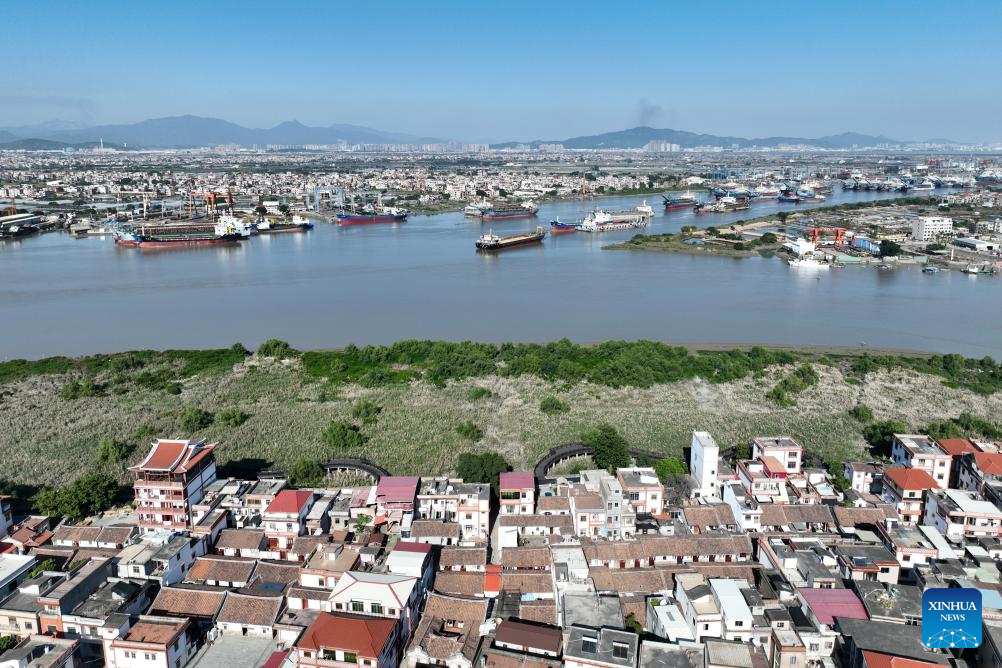
This aerial photo taken on Nov. 20, 2023 shows a view of Yue port in Zhangzhou, southeast China's Fujian Province. Located at the eastern end of the maritime Silk Road, Fujian has given play to its unique strengths in the joint implementation of the Belt and Road Initiative (BRI) and achieved fruitful results in building the core region of the 21st Century Maritime Silk Road.
In recent years, the province has been dedicated to protect legacies along the ancient Maritime Silk Road and tried to revive its historical prosperity.
Quanzhou, for instance, was one of the world's largest ports along the historic Maritime Silk Road, particularly in ancient China's Song Dynasty (960-1279) and Yuan Dynasty (1271-1368). "Quanzhou: Emporium of the World in Song-Yuan China" was accepted by the UNESCO as a cultural property on its World Heritage List in July 2021. (Xinhua/Jiang Kehong)

This aerial photo taken on Nov. 7, 2023 shows the east and west pagodas of Kaiyuan Temple and the surrounding core area for ancient city conservation in Quanzhou, southeast China's Fujian Province. Located at the eastern end of the maritime Silk Road, Fujian has given play to its unique strengths in the joint implementation of the Belt and Road Initiative (BRI) and achieved fruitful results in building the core region of the 21st Century Maritime Silk Road.
In recent years, the province has been dedicated to protect legacies along the ancient Maritime Silk Road and tried to revive its historical prosperity.
Quanzhou, for instance, was one of the world's largest ports along the historic Maritime Silk Road, particularly in ancient China's Song Dynasty (960-1279) and Yuan Dynasty (1271-1368). "Quanzhou: Emporium of the World in Song-Yuan China" was accepted by the UNESCO as a cultural property on its World Heritage List in July 2021. (Xinhua/Jiang Kehong)



